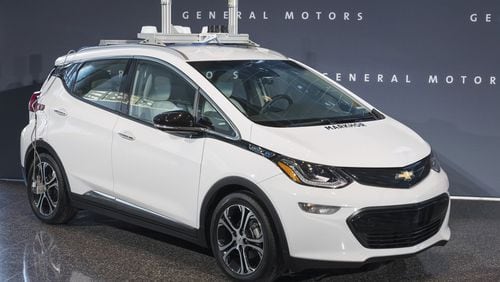Legislation that could pave the way for driverless cars on Georgia roads may have cleared a key hurdle Thursday, as lawmakers rewrote the bill to make it easier for some of the industry’s biggest players to participate.
House Bill 248 would allow pilot projects for "autonomous vehicles" on public roads in certain areas. As originally drafted, critics said it would give one company — General Motors — a big advantage in introducing such vehicles to the Peach State. But lawmakers said a substitute version of the bill unveiled Thursday would allow companies such as Google, Uber and Lyft to compete on an equal footing.
Industry representatives said they’re still reviewing the latest draft, but seemed pleased.
“We’re very encouraged by the direction the committee’s taking with the substitute (bill),” attorney Erik Jones, who represents an industry group, told a subcommittee of the House Transportation Committee on Thursday.
Advocates say autonomous vehicles would make the nation's roads safer because they would eliminate driver error, which causes the overwhelming majority of accidents. Last week the National Safety Council announced that more than 40,000 people died in motor vehicle accidents in the United States last year, including an estimated 1,540 in Georgia.
But with no federal regulations for self-driving cars in place, states are assuming responsibility for ensuring the benefits of the technology can be reaped without sacrificing safety. Federal regulators provided safety guidance to states and automakers last year, but stopped short of issuing binding rules.
Eight states have self-driving car laws, and bills have been introduced in 20 states this year, according to the automaker Volvo.
As originally drafted, HB 248 would have allowed only vehicle manufacturers to initiate pilot projects for autonomous vehicles. Some of the biggest players in the industry — including Google, Uber and Lyft — are developing driverless technology but do not manufacture the vehicles. They feared the House bill — and an almost identical Senate Bill 219 — would exclude them from Georgia roads.
General Motors has argued that restrictions on which companies can put driverless vehicles on the road could be crucial for public acceptance of the technology.
"If somebody is allowed to put technology on the roads and highways that proves to be unsafe, that could have very harmful repercussions," GM lobbyist Harry Lightsey told the Associated Press.
An industry group representing Uber, Lyft and other companies said excluding them would “prevent life-saving innovations from reaching the state and inadvertently lock Georgia residents into using a single company’s products.”
On Thursday both sides expressed their general support for the latest draft of the bill.
HB 248 still faces a vote in the subcommittee. Meanwhile, SB 219 is pending in the Senate Transportation Committee.
About the Author







